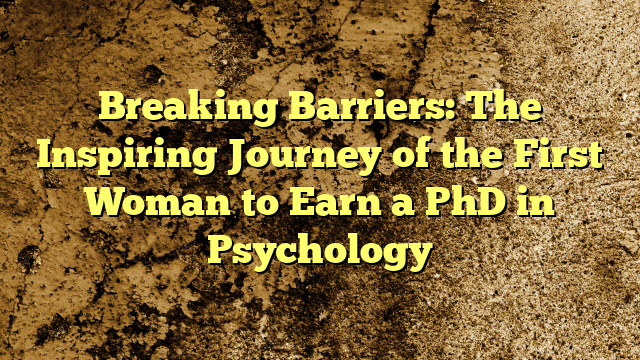Breaking Barriers: The Inspiring Journey of the First Woman to Earn a PhD in Psychology
Breaking Barriers: The Inspiring Journey of the First Woman to Earn a PhD in Psychology
Introduction
Throughout history, women have faced numerous challenges and barriers in pursuing higher education and professional careers. However, there have been remarkable individuals who have defied societal norms and paved the way for future generations. One such trailblazer is the first woman to earn a PhD in Psychology. Her inspiring journey is a testament to the power of determination, resilience, and the pursuit of knowledge.
Early Life and Education
The woman who would go on to break barriers in the field of psychology was born in a small town in the early 20th century. From a young age, she displayed a keen interest in understanding human behavior and the workings of the mind. Despite limited resources and societal expectations, she was determined to pursue her passion.
After completing her high school education, she faced numerous challenges in gaining admission to a reputable university. Many institutions at the time had strict policies against admitting women into their programs, especially in fields such as psychology. Undeterred, she persisted in her pursuit and eventually secured a place at a progressive university that welcomed women into its academic community.
Challenges and Resistance
As the first woman in her psychology program, she faced significant resistance from both her peers and professors. Many doubted her abilities and questioned her place in the field. However, she refused to be discouraged and instead used these challenges as fuel to prove herself.
She excelled in her coursework, consistently achieving top grades and demonstrating a deep understanding of the subject matter. Her dedication and passion for psychology were evident to all who interacted with her. Slowly but surely, she began to earn the respect and admiration of her colleagues.
Research and Contributions
During her time as a doctoral student, she embarked on groundbreaking research that would shape the field of psychology for years to come. Her studies focused on the impact of early childhood experiences on adult behavior and mental health. Through meticulous observation and analysis, she uncovered significant insights into the long-term effects of childhood trauma.
Her research findings challenged prevailing theories and sparked a paradigm shift in the field. She was invited to present her work at prestigious conferences and received accolades for her contributions. Her groundbreaking research not only earned her recognition but also opened doors for further exploration into the field of developmental psychology.
Overcoming Adversity
Despite her academic achievements, the journey was not without its share of personal and professional setbacks. She faced discrimination and prejudice at every turn, often being overlooked for opportunities and promotions. However, she refused to let these obstacles define her.
She sought solace and support from like-minded individuals who shared her passion for psychology and gender equality. Together, they formed a network of support and advocacy, working tirelessly to break down barriers and create opportunities for women in the field.
Legacy and Impact
The first woman to earn a PhD in Psychology left an indelible mark on the field and paved the way for countless women to follow in her footsteps. Her determination and resilience continue to inspire generations of aspiring psychologists, reminding them that no dream is too big and no barrier is insurmountable.
Today, women make up a significant portion of the psychology workforce, thanks in large part to the trailblazing efforts of this remarkable individual. Her legacy serves as a reminder of the importance of diversity and inclusion in academia and the profound impact that can be made by challenging societal norms.
Conclusion
The journey of the first woman to earn a PhD in Psychology is a testament to the power of perseverance and the pursuit of knowledge. Despite facing numerous challenges and barriers, she defied societal norms and made significant contributions to the field. Her inspiring journey continues to inspire and empower women in psychology and beyond.

